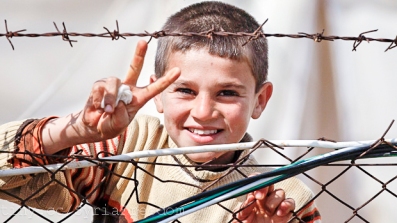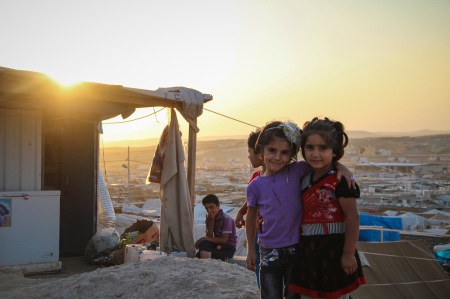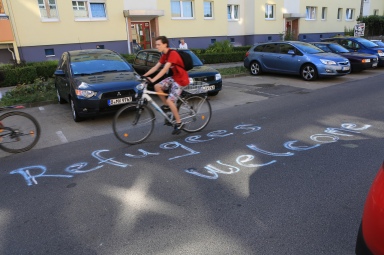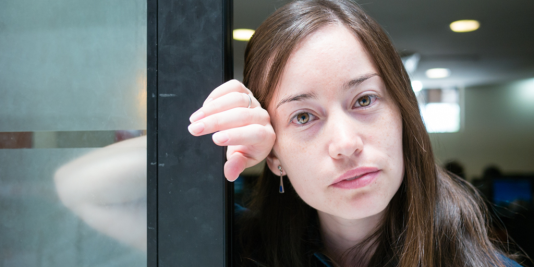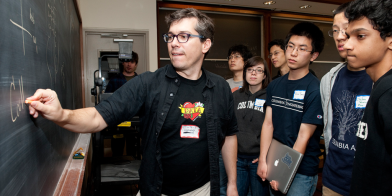Over the past 3 months I have been working at a London inner-city school. Having been educated in the German system I was able to experience a British school with a contrasting perspective. Let me know in the comments how this British school differs from your school or national education system. I’d love to hear how things are done where you are!
- Students line up outside the classroom and before the lesson and inside the classroom after the lesson, waiting for the teacher to invite them in or release them, respectively. They also line up after lunch break to enter the building in an orderly fashion
- Yellow separating lines in the corridors and on stairs make sure that two-way traffic is possible within the school building.
- Between lessons the teaching staff stand in the corridors to make sure that students get to their next class in a quiet and orderly fashion.
- Students wear school uniforms. Students in casual attire may not enter the school building. Teachers are asked to dress formally and address each other with ‘Sir’ and ‘Miss’. Addressing a teacher by their first name is not allowed.
- Nike and Adidas backpacks are terribly fashionable. I estimate that 90% of all students have one. Similarly, sports shoes are a source of pride, especially for the boys.
- Mobile phones are strictly prohibited on school grounds. Any spotted device will be immediately confiscated for at least a number of days.
- In class, each student has a work book for every subject, which they are not allowed to take home. The teachers keep them, grade the quality of the work and provide written feedback. Worksheets are glued in.
- Teachers try to minimise passive learning (classical teaching) and try to engage students through activities – from crossword puzzles to tinkering with circuit boards.
- Teachers need to be able to prove that learning occurs in every single lesson. Therefore, teachers present the ‘learning objectives’ at the beginning of the class. At the end of the lesson the students have to write into their workbooks what they learned in that lesson.
- Teachers have access to a database, which details previous, current and expected grades as well as any identified special needs (e.g. learning difficulties, emotional or psychological instabilities) and financial standing (free school meals) for every student. This information is used to provide extra support for disadvantaged students.
- The date is also used to set the difficulty of the tasks during the lesson as well as the difficulty of the homework. Teachers are held accountable for providing each student with the appropriate difficulty. It may be that the teacher has to prepare the same worksheet in three variants in order to cover all the levels of ability of the students in a class. On top of that come special needs students.
- A number of staff members deal exclusively with the special needs students. They offer one-on-one tutoring and lots of psychological coaching (anger management, self-confidence building).
- Teachers can ask lab technicians to organise an experiment in advance and have the materials delivered to the classroom. Sometimes the lab technicians will even perform demonstrations (e.g. alkali metals in water).
- Students of a year group (year 7, year 8 etc,) are organised into classes (7A, 7B etc.) based on their levels of ability. The most able students are in the A-set (7A, 8A etc.). A year 8 student may be in 8A for English, but in 8C for Science and in 8D for History.
- Every six weeks the students are reevaluated and can move up or down in the classes. In rare cases, students can skip a year. Repeating a year practically never happens.
- When a student disrupts the class the teacher writes the names on the board. Two further disruptions lead to a ‘demerit’ (a negative point that is recorded school-internally). A third disruption can lead to same-day detention. Students may also be sent outside the classroom for a few minutes or their parents might get a ‘bad news slip’, which details their disruptive behaviour.
- Every week a few kids get excluded from school for a few days due to improper behaviour. A kid tried to trip me, which led to a two-day exclusion.
- The so called ‘pastoral managers’ are equipped with walkie-talkies and assist teachers upon request by paying classrooms a visit and restoring behaviour that is conducive for learning. They have the power to keep, exclude and expel students. They are highly respected by the students.
- Good behaviour is rewarded with ‘merits’, which are – just like demerits –accumulated over the year. Merits can lead to great prizes such as a Samsung tablet or a bicycle, while demerits may result in the student not being allowed to go on school trips. Students can be expelled on the basis of bad behavior.
- Every classroom is equipped with a surveillance camera, which is often times used as evidence when one statement stands against another statement. One kid was caught frequently disconnecting the power cable from the computer to stall the class.
Let me know in the comments how this British school differs from your school or national education system. I’d love to hear how things are done where you are!
Merry Christmas!


